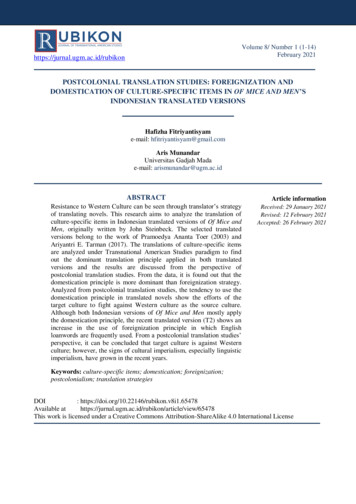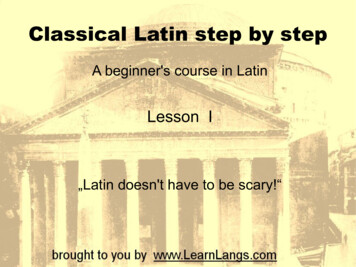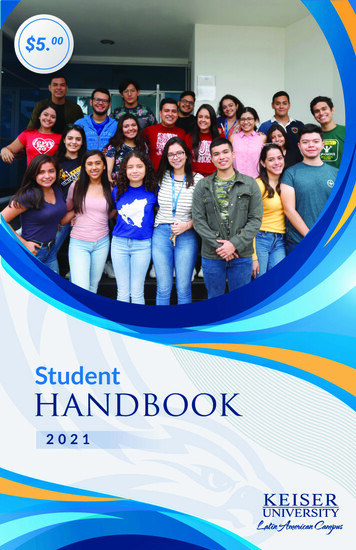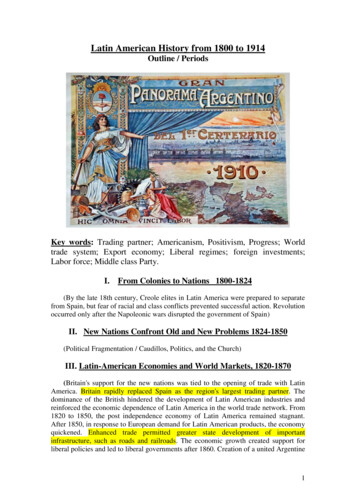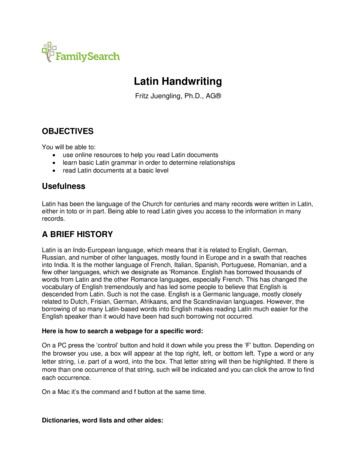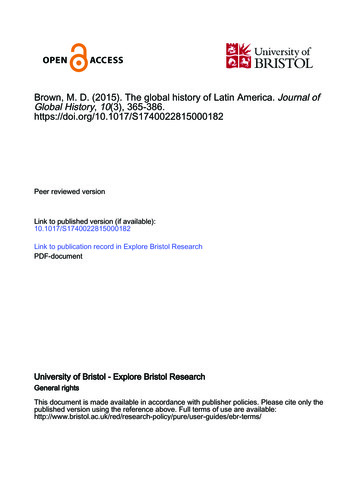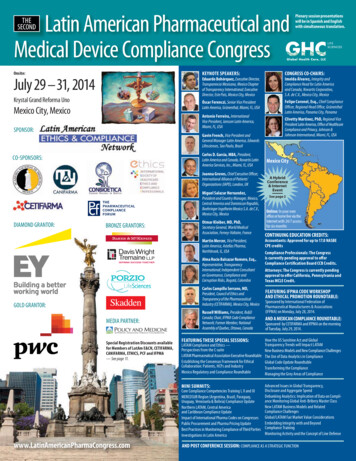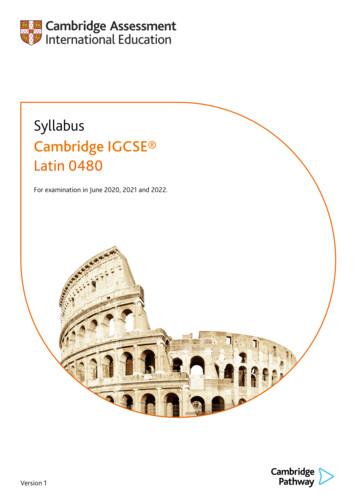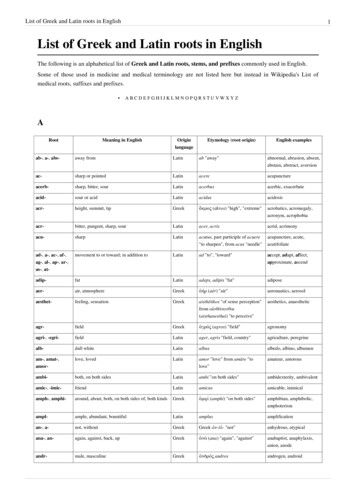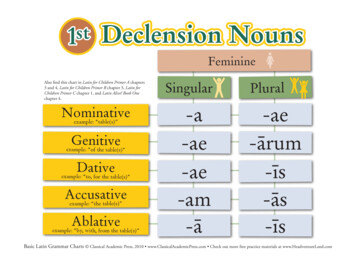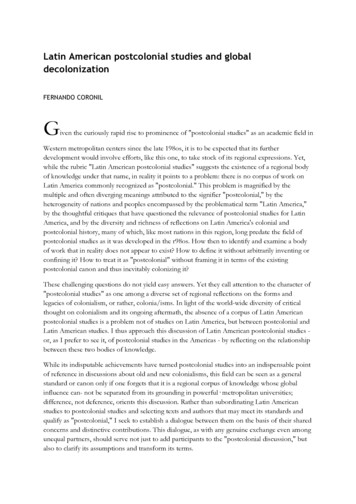
Transcription
Latin American postcolonial studies and globaldecolonizationFERNANDO CORONILGiven the curiously rapid rise to prominence of "postcolonial studies" as an academic field inWestern metropolitan centers since the late 198os, it is to be expected that its furtherdevelopment would involve efforts, like this one, to take stock of its regional expressions. Yet,while the rubric "Latin American postcolonial studies" suggests the existence of a regional bodyof knowledge under that name, in reality it points to a problem: there is no corpus of work onLatin America commonly recognized as "postcolonial." This problem is magnified by themultiple and often diverging meanings attributed to the signifier "postcolonial," by theheterogeneity of nations and peoples encompassed by the problematical term "Latin America,"by the thoughtful critiques that have questioned the relevance of postcolonial studies for LatinAmerica, and by the diversity and richness of reflections on Latin America's colonial andpostcolonial history, many of which, like most nations in this region, long predate the field ofpostcolonial studies as it was developed in the r98os. How then to identify and examine a bodyof work that in reality does not appear to exist? How to define it without arbitrarily inventing orconfining it? How to treat it as "postcolonial" without framing it in terms of the existingpostcolonial canon and thus inevitably colonizing it?These challenging questions do not yield easy answers. Yet they call attention to the character of"postcolonial studies" as one among a diverse set of regional reflections on the forms andlegacies of colonialism, or rather, colonia/isms. In light of the world-wide diversity of criticalthought on colonialism and its ongoing aftermath, the absence of a corpus of Latin Americanpostcolonial studies is a problem not of studies on Latin America, but between postcolonial andLatin American studies. I thus approach this discussion of Latin American postcolonial studies or, as I prefer to see it, of postcolonial studies in the Americas - by reflecting on the relationshipbetween these two bodies of knowledge.While its indisputable achievements have turned postcolonial studies into an indispensable pointof reference in discussions about old and new colonialisms, this field can be seen as a generalstandard or canon only if one forgets that it is a regional corpus of knowledge whose globalinfluence can not be separated from its grounding in powerful· metropolitan universities;difference, not deference, orients this discussion. Rather than subordinating Latin Americanstudies to postcolonial studies and selecting texts and authors that may meet its standards andqualify as "postcolonial," I seek to establish a dialogue between them on the basis of their sharedconcerns and distinctive contributions. This dialogue, as with any genuine exchange even amongunequal partners, should serve not just to add participants to the "postcolonial discussion," butalso to clarify its assumptions and transform its terms.
Worlds & Knowledges Otherwise Spring 2013FERNANDOMy discussion is divided into four sections:(a) theCORONILformation of the field of postcolonial studies;(b) the place of Latin America in postcolonial studies; (c) responses to postcolonial studies fromLatin Americanists; and (d) open ended suggestions for deepening the dialogue betweenpostcolonial and Latin American studies. By focusing on exchanges between these fields, I havetraded the option of offering close readings of selected texts and problems for the option ofengaging texts that have addressed the postcolonial debate in terms of how they shape or definethe fields of postcolonial and Latin American studies.Postcolonial studiesDespite a long history of critical reflections on modern colonialism originating in reactions to theconquest and colonization of the Americas, "post colonialism" as a term and as a conceptualcategory originates in discussions about the decolonization of African and Asian colonies afterthe Second World War. At that time, "postcolonial" was used mostly as an adjective bysociologists and political scientists to characterize changes in the states and economies of excolonies of the "Third World," a category that was also created at that time. This regional focuswas already present in French sociologist George Balandier's analysis of "the colonial situation"(1951) as well as in later debates about the "colonial" and "postcolonial state" (Alavi 1972;Chandra 1981), the "colonial mode of production" (Alavi et al. 1982), or the"articulation ofmodes of production" (Wolpe 1980; Berman and Londsale 1992). Although Latin America wasconsidered part of the Third World, because most of its nations had achieved politicalindependence during the first quarter of the nineteenth century, it was only tangentiallyaddressed in these discussions about decolonization that centered on the newly independentnations of Africa and Asia.As "old" postcolonial nations that had faced the problem of national development for a longtime, the key word in Latin American social thought during this period was not colonialism orpostcolonialism, but "dependency." This term identified a formidable body of work developedby leftist scholars in the 196os, designed to understand Latin America's distinct historicaltrajectory and to counter modernization theory. Riding atop the wave of economic growth thatfollowed the Second World War, modernization theory presented capitalism as an alternative tosocialism and argued than achieving modernity would overcome obstacles inhering in theeconomies, cultures, and subjective motivations of the peoples of the "traditional" societies ofthe Third World. W. W. Rostow's The Stages of Economic Growth (196o), revealingly subtitledA Non-Communist Manifesto, was a particularly clear example of modernization theory'sunilinear historicism, ideological investment in capitalism, and teleological view of progress.In sharp contrast, dependency theorists argued that development and underdevelopment are themutually dependent outcomes of capitalist accumulation on a world scale. In their view, sinceunderdevelopment is the product of development, the periphery cannot be modernized byunregulated capitalism but through an alteration of its polarizing dynamics. This basic insightinto the mutual constitution of centers and peripheries was rooted in Argentinian economistRaul Prebisch's demonstration that unequal trade among nations leads to their unequal
Fernando Coronildevelopment. Formulated in the 1940s, Prebisch's critique of unequal exchange has beenconsidered "the most influential idea about economy and society ever to come out of LatinAmerica" (Love 1980: 46). His insights were integrated into "structural" reinterpretations ofsocial and historical transformation in Latin America by Fernando Enrique Cardoso, EnzoFaletto, Anibal Quijano, Theotonio Dos Santos, Rui Mauro Marini, and many other"dependency" theorists; as Cardoso (1977) noted, their work was "consumed" in the UnitedStates as "dependency theory" associated with the work of Andre Gunder Frank.The world-wide influence of dependency declined after the 1970s. Dependency theory wascriticized for its one-dimensional structuralism and displaced by the postmodern emphasis onthe textual, fragmentary and indeterminate; its Eurocentric focus on state-centered developmentand disregard of racial and ethnic divisions in Latin American nations has been a focus of arecent critique (Grosfoguel 2ooo). Despite its shortcomings, in my view the dependency schoolrepresents one of Latin America's most significant contributions to postcolonial thought withinthis period, auguring the post colonial critique of historicism, and providing conceptual tools fora much needed postcolonial critique of contemporary imperialism. As a fundamental critique ofEurocentric conceptions of history and of capitalist development, dependency theoryundermined historicist narratives of the "traditional," "transitional," and "modern," making itnecessary to examine postcolonial and metropolitan nations in relation to each other throughcategories appropriate to specific situations of dependency.Starting around three decades after the Second World War, the second usage of the term"postcolonial" developed in the Anglophone world in connection with critical studies ofcolonialism and colonial literature under the influence of postmodern perspectives. This changetook place during a historical juncture formed by four intertwined world-wide processes: theincreasingly evident shortcomings of Third-World national development projects; the breakdownof really existing socialism; the ascendance of conservative politics in Britain (Thatcherism) andthe United States (Reaganism); and the overwhelming appearance of neoliberal capitalism as theonly visible, or at least seemingly viable, historical horizon. During this period, postcolonialstudies acquired a distinctive identity as an academic field, marked by the unusual marriagebetween the metropolitan location of its production and the anti-imperial stance of its authors,many of whom were linked to the Third World by personal ties and political choice.In this second phase, while historical work has centered on British colonialism, literary criticismhas focused on Anglophone texts, including those from Australia and the English-speakingCaribbean. The use of postmodern and poststructuralist perspectives in these works became sointimately associated with postcolonialism that the "post" of postcolonialism has becomeidentified with the "post" of postmodernism and poststructuralism. For instance, a majorpostcolonial Reader argues that "postcolonial studies is a decidedly new field of scholarshiparising in Western universities as the application of post-modern thought to the long history ofcolonising practices" (Schwarz 2000: 6).In my view, equally central to postcolonialism has been the critical application of Marxism to abroad spectrum of practices of social and cultural domination not reducible to the category of"class." While marked by idiosyncratic traces, its identifying signature has been the convergenceof these theoretical currents - Marxist and postmodern/poststructuralist - in studies that address
Worlds & Knowledges Otherwise Spring 2013CORONILthe complicity between knowledge andFERNANDOpower. EdwardW. Said's integration of Gramscian andFoucauldian perspectives in his path breaking critique of Orientalism (1978) has been widelyrecognized as foundational for the field. A similar tension between Marxism andpoststructuralism animates the evolving work of the South Asian group of historians associatedwith Subaltern Studies, the strongest historiographical current of postcolonial studies.Postcolonial critique now encompasses problems as different as the formation of minorities inthe United States and African philosophy. But while it has expanded to new areas, it hasretreated from analyzing their relations within a unified field; the fragmentary study of parts hastaken precedence over the systemic analysis of wholes. Its critique of the grand narratives ofmodernity has led to skepticism towards any grand narrative, not always discriminating betweenEurocentric claims to universality and the necessary universalism arising from struggles againstworld-wide capitalist domination (Amin 1989; Lazarus 1999a).As the offspring of a tense marriage between anti-imperial critique and metropolitan privilege,postcolonial studies is permeated by tensions that also affect its reception, provoking sharplydifferent evaluations of its signif icance and political implications. While some analysts see it asan academic commodity that serves the interests of global capital and benefits its privilegedpractitioners (Dirlik 1994), others regard it as a paradigmatic intellectual shift that redefines therelationship between knowledge and emancipatory politics (Young 2001). This debate helpsidentify what in my view is the central intellectual challenge postcolonial studies has raised: todevelop a bifocal perspective that allows one, on the one hand, to view colonialism as afundamental process in the formation of the modern world without reducing history tocolonialism as an all-encompassing process and, on the other hand, to contest modernity and itsEurocentric forms of knowledge without presuming to view history from a privilegedepistemological standpoint.In this light, the apparently simple grammatical juxtaposition of "post" and "colonial" in"postcolonial studies" serves as a sign to address the murky entanglement of knowledge andpower. The "post" functions both as a temporal marker to refer to the problem of classifyingsocieties in historical time and as an epistemological sign to evoke the problem of producingknowledge of history and society in the context of imperial relations.Postcolonial studies and Latin AmericaGiven this genealogy, it is remarkable but understandable that debates and texts on or from LatinAmerica do not figure significantly in the field of post colonial studies as it has been definedsince the 198os. As Peter Hulme (1996) has noted, Said's canonical Culture and Imperialism(1993) is emblematic of this tendency: it centers on British and French imperialism from the latenineteenth century to the present; its geographical focus is limited to an area stretching fromAlgeria to India; and the role of the United States is restricted to the post Second World Warperiod, disregarding this nation's origin as a colonial settlement of Britain, Spain, and France, theprocesses of internal colonialism through which Native Americans were subjected within itsterritory, and its imperial designs in the Americas and elsewhere from the nineteenth century to
Fernando Coronilthe present.The major Readers and discussions on postcolonial studies barely take Latin America intoaccount. One of the earliest attempts to discuss post colonial literatures as a comprehensivefield, The Empire Writes Back: Theory and Practice in Post-Colonial Literatures (Aschroft,Griffiths, and Tiffin 1989 ), acknowledges a focus on Anglophone literatures. Even so, itsextensive sixteen-page bibliography, including "all the works cited in the text, and someadditional useful publications" (22.4), fails to mention even a single text written on LatinAmerica or by a Latin American author. The book treats Anglophone literatures, including thoseproduced in the Caribbean, as if these literatures were not cross-fertilized by the travel of ideasand authors across regions and cultures-or at least as if the literatures resulting from the Iberiancolonization of the Americas had not participated in this exchange.This exclusion of Latin America was clearly reflected in the first general anthology ofpostcolonial texts, Colonial Discourse and Postcolonial Theory (P. Williams and Chrisman1993), whose thirty-one articles include no author from Iberoamerica. Published two years later,The Post-colonial Studies Reader (Aschroft, Griffiths and Tiffin 1995), reproduces the Anglo centric perspective that characterizes their earlier The Empires Writes Back, but this timewithout the justification of a topical focus .on English literatures. The Reader features eighty-sixtexts divided into fourteen thematic sections, including topics such as nationalism and hybridity,which have long concerned Latin American thinkers. While some authors are repeated underdifferent topics (Bhabha appears three times, Spivak twice), the only author associated with LatinAmerica is Jose Rabasa, whose contribution is a critical reading of Mercator's Atlas, a topicrelevant but not specific to Latin America.The marginalization of Latin America is reproduced in most works on postcolonialism publishedsince then. For example, Leela Gandhi's Post colonial Theory: A Critical Introduction (1998)does not discuss Latin American critical reflections or include even a single reference to LatinAmerican thinkers in its extensive bibliography. While Relocating Postcolonialism (Goldberg andQuayson 2002) "relocates" the postcolonial through the inclusion of such topics as the culturalpolitics of the French radical right and the construction of Korean-American identities, itmaintains the exclusion of Latin America by having no articles or authors associated with thisarea. This taken-for-granted exclusion appears as well in a dialogue between John Comaroff andHomi Bhabha that introduces the book. Following Comaroff's suggestion, they provide ahistorical frame for "postcoloniality" in terms of two periods: the decolonization of the ThirdWorld marked by India's independence in I947 and the hegemony of neoliberal capitalismsignaled by the end of the Cold War in r989 (Goldberg and Quayson 2002: I5).In contrast, two recent works on postcolonialism include Latin America within the postcolonialfield, yet their sharply different criteria highlight the problem of discerning the boundaries of thisfield. In an article for a book on the postcolonial debate in Latin America, Bill Aschroft (whoseco edited book, as has been mentioned above, basically excludes Latin America) presents LatinAmerica as "modernity's first born" and thus as a region that has participated since its inceptionin the production of postcolonial dis courses (r999). He defines postcolonial discoursecomprehensively as "the discourse of the colonized" produced in colonial contexts; as such, itdoes not have be "anticolonial" (r4-r5). He presents Menchu's I, Rigoberta Menchu and Juan
Worlds & Knowledges Otherwise Spring 2013Rulfo's Pedro Paramo as examples thatFERNANDOreveal thatCORONIL"the transformative strategies of postcolonialdiscourse, strategies which engage the deepest disruptions of modernity, are not limited to therecent colonized" (28). While his comprehensive definition of the field includes Latin Americandiscourses from the conquest onwards, his examples suggest a narrower field defined by morediscriminating but unexamined criteria.The second text is Robert Young's Postcolonialism: An Historical Introduction (20or). WhileYoung (like Aschcroft) had not discussed Latin America in a previous work (White Mythologies,1990) that had served to sacralize Said, Bhabha, and Spivak as the foundational trinity ofpostcolonial stud ies, in his new book he gives such foundational importance to Latin Americaand to the Third World that he prefers to.name the field "tricontinentalism," after theTricontinental conference held in Havana in 1966 (20or: 57). Young recognizes thatpostcolonialism has long and varied genealogies, but he finds it necessary to restrict it toanticolonial thought developed after formal political independence has been achieved: "Many ofthe problems raised can be resolved if the postcolonial is defined as coming after colonialism andimperialism, in their original meaning of direct-rule domination" (57). Yet Young distinguishesfurther between the anticolonial thought of the periphery and the more theoretical thoughtformed at the heart of empires "when the political and cultural experience of the marginalisedperiphery developed into a more general theoretical position that could be set against westernpolitical, intellectual and academic hegemony and its protocols of objective knowledge" (65).Thus, even successful anticolonial movements "did not fully establish the equal value of thecultures of the decolonised nations." "To do that," Young argues, "it was necessary to take thestruggle into the heart lands of the former colonial powers" (65).Young's suggestive discussion of Latin American postcolonial thought leaves unclear the extentto which its anticolonialism is also "critical" in the sense he ascribes to metropolitan reflections.Young discusses Latin American postcolonial thought in two brief chapters. The first, "LatinAmerica I: Mariategui, Transculturation and Cultural Dependency," is divided into four sections:"Marxism in Latin America," an account of the development of communist parties and Marxistthinkers in the twentieth century, leading to the Cuban revolution; "Mexico 1910," a presentationof the Mexican revolution as precursor of tricontinental insurrections against colonial or neo colonial exploitation; "Mariategui," a discussion of Mariategui's role as one of Latin America'smost original thinkers, highlighting his innovative inter pretation of Peruvian reality; and"Cultural Dependency," an overview of the ideas of some cultural critics which, for brevity'ssake, I will reduce to a few names and to the key concepts associated with their work: BrazilianOswald de Andrade's "anthropophagy;' (the formation of Latin American identity through the"digestion" of world-wide cultural formations); Cuban Fernando Ortiz's "transculturation" (thetransformative creation of cultures out of colonial confrontations); Brazilian Roberto Schwarz's"misplaced ideas" (the juxtaposition in the Americas of ideas from different times and societies);and Argentinian Nestor Garcia Canclini's "hybrid cultures" (the negotiation of the traditional andthe modern in Latin American cultural formations).Young's second chapter, "Latin America II: Cuba-Guevara, Castro, and the Tricontinental,"organized around the centrality of Cuba in the development of postcolonial thought, is dividedinto three sections: "Compafiero: Che Guevara," focuses on Guevara's antiracism and radicalhumanism; "New Man" relates Guevara's concept of "the new man" to Jose Marti's proposal of
Fernando Coronilcultural and political independence for "Our America" and toRoberto Fernandez Retamar's Calibanesque vision of mestizaje; and the "Tricontinental," whichpresents the "Tricontinental Conference of Solidarity of the Peoples of Africa, Asia and LatinAmerica" held in Havana in 1966 as the founding moment of postcolonial thought; in Young'swords, "Postcolonialism was born with the Tricontinental" (2oor: 213).While Young's selection is comprehensive and reasonable, its organizing criteria are notsufficiently clear; one can easily imagine a different selection involving other thinkers andanticolonial struggles in Latin America. Despite the significance he attaches to theoreticalreflections from metropolitan centers, Young makes no mention of the many Latin Americanistswho, working from those centers or from shifting locations between them and Latin America,have produced monumental critiques of colonialism during the same period as Said, Bhabha,and Spivak - for example, Enrique Dussel, Anibal Quijano, and Walter Mignolo, among others.The contrasting positions of Ashcroft and Young reveal the difficulty of defining postcolonialstudies in Latin America. At one extreme, we encounter a comprehensive discursive field whosevirtue is also its failing, for it must be subdivided to be useful. At the other extreme, weencounter a restricted domain that includes an appreciative and impressive selection of authors,but that needs to be organized through less discretionary criteria. Whether one adopts an openor a restricted definition of Latin American postcolonial studies, however, what is fundamental isto treat alike, with the same intellectual earnestness, all the thinkers and discourses included inthe general field of postcolonial studies, whether they are produced in the metropolitan centersor in the various peripheries, writing or speaking in English or in other imperial and subalternlanguages. Otherwise, the evaluation of post colonial thought risks reproducing within its midstthe subalternization of peoples and cultures it claims to oppose.Latin American studies and postcolonial studiesIt is understandable that the reception of postcolonial studies among Latin Americanists shouldhave been mixed. Many thinkers have doubted the appropriateness of postcolonial studies toLatin America, claiming that post colonial studies responds to the academic concerns ofmetropolitan universities, to the specific realities of Asia and Africa, or to the position ofacademics who write about, not from, Latin America, and disregard its own cultural traditions(Achugar 1998; Colas 1995; IZlor de Alva 1992, 1995; Moraiia I997; Perez 1999; and YudiceI996). Klor de Alva has presented the most extreme critique, arguing that colonialism andpostcolonialism are "(Latin) American mirages," for these terms, "as they are used in the relevantliterature," or "as commonly understood today," properly apply only to marginal populations ofindigenes, not to the major non-Indian core that has formed the largely European and Christiansocieties of the American territories since the sixteenth century. For him, its wars ofindependence were not anticolonial wars, but elite struggles inspired in European models thatmaintained colonial inequalities.This argument, in my view, has several problems: it takes as given the standard set by discussions
Worlds & Knowledges Otherwise Spring 2013FERNANDO CORONILof the Asian and African colonial and postcolonialexperiences; it assumes too sharp a separationbetween indigenous and non-indigenous peoples in America; it adopts a restricted conception ofcolonialism derived from a homogenized reading of Northern European colonialism and anidealized image of the effectiveness of its rule; it disregards the importance of the colonialcontrol of territories in Iberian colonialism; it pays insufficient attention to the colonial controlof populations in the high-density indigenous societies of Mexico, Peru, and Central Americaand in plantations run by imported slave labor in the Caribbean and Brazil; and it fails to see thesimilarity between the wars of independence and the decolonizing processes of Asia and Africa,which also involved the preservation of elite privilege and the reproduction of internalinequalities (what Pablo Gonzalez Casanova [r965) and Rodolfo Stavenhagen [1965) havetheorized for Latin America as "internal colonialism"). Rather than presenting one set of colonialexperiences as its exclusive standard, a more productive option would be to pluralize colonialism- to recognize its multiple forms as the product of a common historical process of Westernexpansion.An influential debate on colonial and postcolonial studies in a major journal of Latin Americanstudies was initiated by Patricia Seed, a historian of colonial Latin America, who presented themethods and concepts of colonial and postcolonial discourse as a significant breakthrough insocial analysis. According to Seed ( 1991), postcolonial studies' critique of conceptions of thesubject as unitary and sovereign, and of meaning as transparently expressed through language,recasts discussions of colonial domination that are simplistically polarized as resistance versusaccommodation by autonomous subjects. Two years later in the same journal, three literarycritics questioned her argument from different angles. Hernan Vidal expressed misgivings about"the presumption that when a new analytic and interpretative approach is being introduced, theaccumulation of similar efforts in the past is left superseded and nullified," which he called"technocratic literary criticism" ( r 993: II?). Rolena Adorno (1993), echoingi Klor de Alva'sargument, argued for the need to recognize the distinctiveness of Latin America's historicalexperience, suggesting that colonial and postcolonial discourse may more properly apply to thehistorical experience of Asia and Africa. Walter Mignolo (1993) for his part, argued for the needto distinguish among three critiques of modernity: postmodernism (its internal expression),postcolonialism (its Asian and African modality), and postoccidentalism (its Latin Americanmanifestation). Yet far from regarding postcolonialism as irrelevant for Latin America, hesuggested that we treat the former as liminal space for developing knowledge from our variousloci of enunciation. Mignolo has developed his ideas of "postoccidentalism" (building on itsoriginal conception by Fernandez Retamar [1974), and on my own critique of "occidentalism"[Coronil 1996)) in his pathbreaking Local Histories I Global Designs (:woo), a discussion of theproduction of non-imperial knowledge that draws on wide-ranging Latin American reflections, inparticular Quijano's notion of the "coloniality of power" (2ooo) and Enrique Dussel's critique ofEurocentrism (1995).Subaltern Studies has been widely recognized as a major current in the postcolonial field. Whilehistorians developed Subaltern Studies in South Asia, literary theorists have played a major rolein the formation of Subaltern Studies in the Latin American context. Around the time of theSeed debate, the Latin American Subaltern Studies Group was founded at a meeting of the LatinAmerican Studies Association in 1992. Unlike its South Asian counterpart, after which it was
Fernando Coronilnamed, it was initially composed of literary critics, with the exception of Seed and twoanthropologists who soon thereafter left the group. Its "Founding Statement" offered a sweepingoverview of major stages of Latin American studies, rejecting their common modernistfoundations and celebrating the South Asian critique of elitist representations of the subaltern.However, unlike the South Asian Group, formed by a small group of historians organizedaround a coherent historiographical and editorial project centered on rewriting the history ofIndia, this group, mostly composed of literary critics, was characterized by its diverse and shiftingmembership and the heterogeneity of their disciplinary concerns and research agendas. While thepublications of its members have not fitted within traditional disciplinary boundaries, they haveprivileged the interpretation of texts over the analysis of historical transformations. The group'sattempt to represent the subaltern has typically taken the form of readings of texts produced byauthors considered subaltern or dealing with the issue of subalternity. In its decade-long life (Imyself participated in the second half of
Latin American studies. I thus approach this discussion of Latin American postcolonial studies - or, as I prefer to see it, of postcolonial studies in the Americas - by reflecting on the relationship between these two bodies of knowledge. While its indisputable achievements have turned postcolonial studies into an indispensable point
